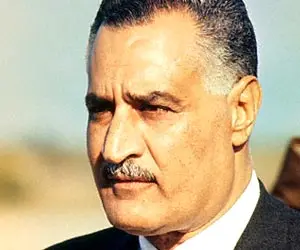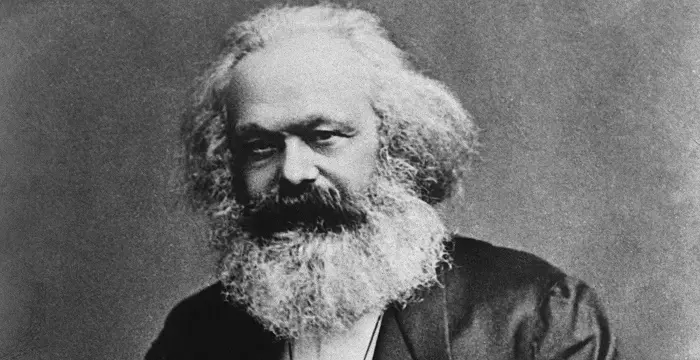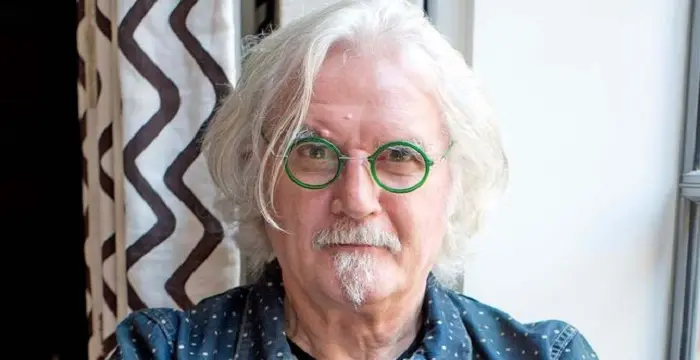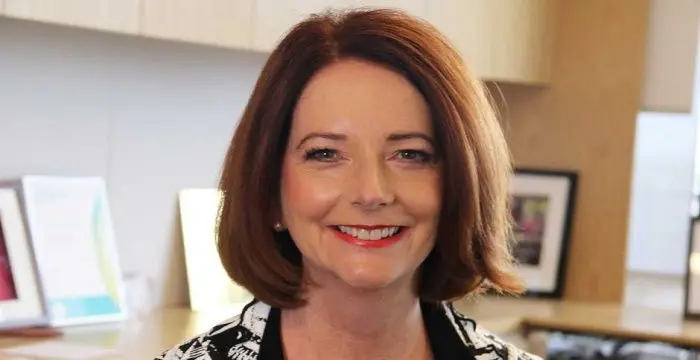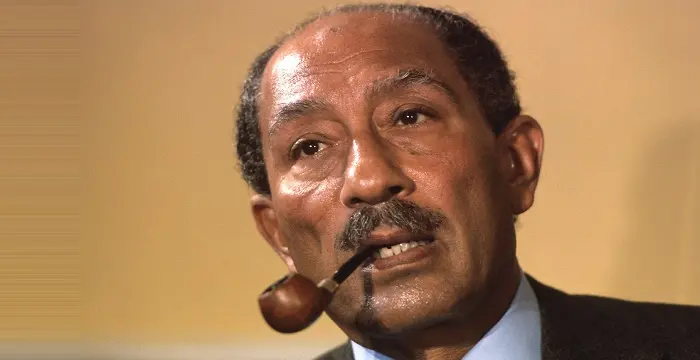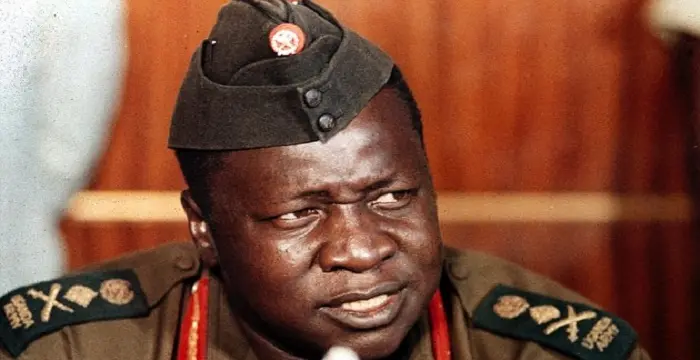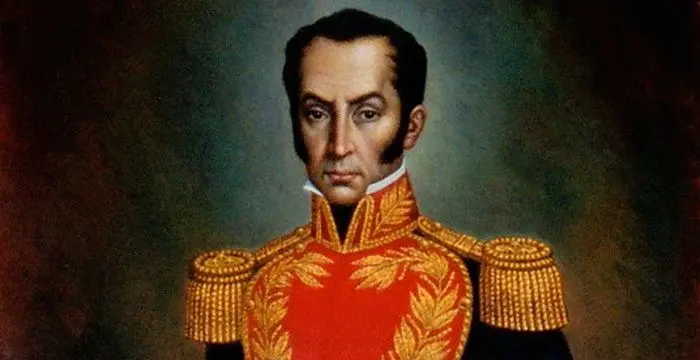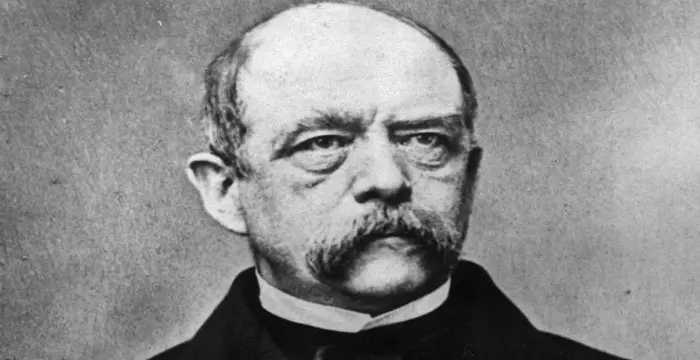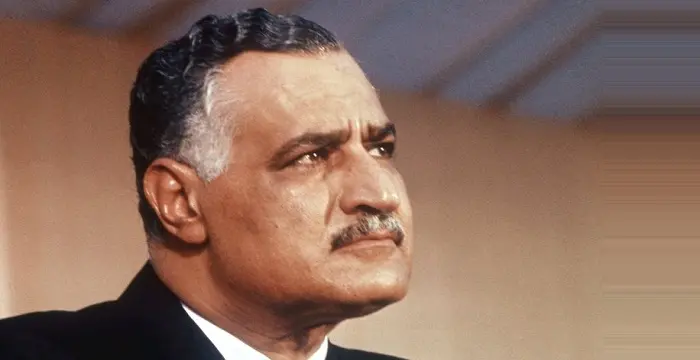
Gamal Abdel Nasser - Political Leader of Egypt, Birthday and Childhood
Gamal Abdel Nasser's Personal Details
Gamal Abdel Nasser was the 2nd President of Egypt and later emerged as a flag bearer of the Arab countries against the West.
| Information | Detail |
|---|---|
| Birthday | January 15, 1918 |
| Died on | September 28, 1970 |
| Nationality | Egyptian |
| Famous | Socialists, Leaders, Political Leaders, Presidents, Political Leader of Egypt |
| Ideologies | Socialists |
| Spouses | Tahia Kazim (m. 1944) |
| Siblings | al-Leithi, Izz al-Arab |
| Childrens | Abdel Hakim Abdel Nasser, Abdel Hamid Abdel Nasser, Hoda Abdel Nasser, Khalid Abdel Nasser, Mona Gamal Abdel Nasser |
| Universities |
|
| Birth Place | Alexandria |
| Political Ideology | Arab Socialist Union |
| Religion | Sunni Islam |
| Gender | Male |
| Father | Abdel Nasser Hussein |
| Mother | Fahima |
| Sun Sign | Capricorn |
| Born in | Alexandria |
| Famous as | Political Leader of Egypt |
| Died at Age | 52 |
Gamal Abdel Nasser's photo
Who is Gamal Abdel Nasser?
Gamal Abdel Naseer was one of the foremost rulers of Egypt who served as the second President of the country from 1956 until his death in 1970. All through his life, he retained important position in the military and in the political scene of Egypt. He was solely responsible for the overthrowing of the monarchy and the establishment of the new government. Though he is often quoted as a controversial leader for his radical leadership policies and wars with Israel, he nevertheless is acclaimed for quite a many things within Egypt and the Arab world including anti-imperialist efforts, assertion of social justice, Arab unity, modernization policy and nationalization of the Suez Canal. Furthermore, major socialist measures, economic and industrial growth in Egypt also occurred during his Presidency. While his popularity was relatively scarce initially, it was the victory over the Suez Canal issue and the subsequent retaliation of the British, French and Israeli forces that provided a strong boost to his political standing. In 1958, he formed United Arab Republic with Syria which lasted until 1961. Till date, he remains to be an iconic figure in the Arab world. To know in details about his life and profile, a further reading of the article would be of help.
// Famous Socialists
Karl Marx
Karl Marx was a Prussian-German philosopher, revolutionary, historian and socialist whose communist ideologies and works laid the foundation for ‘Marxism’. Explore this biography to learn more about his childhood, life achievements, works & timeline.
Billy Connolly
Billy Connolly is a Scottish actor, musician and stand-up comedian. Check out this biography to know about his childhood, family life, achievements and fun facts about his
Julia Gillard
Julia Gillard is a former Prime Minister of Australia and the first woman to hold the position. To know more about her childhood, career, profile and timeline read on
Childhood & Early Life
Gamal Abdel Nasser was born to Fahima and Abdel Nasser Hussein in Bakos, Alexdandria. He had two younger siblings. His father was employed in postal service due to which the family relocated several times.
Academically, he completed his basic education from Nahhasin Elementary School in Cairo, while living with his paternal uncle. His mother’s death in 1926 deeply affected him.
He moved to Alexandria with his father and enrolled himself at the Ras el-Tin secondary school. It was during this time that he became increasingly involved in political activities, however without any ulterior motive.
In the years to follow, his political pursuits increased considerably. He organized and took part in various anti-British street demonstrations. He also strongly voiced his opinion against the Anglo-Egyptian Treaty of 1936, which found support by Egypt's political forces.
Career
After completing his education, he enrolled at the Royal Military Academy graduating from the same in 1938 as a second lieutenant. His first posting was in the town of Mankabad.
In the years to follow, he rendered his service to the Egyptian army, both as an officer and teacher. His first battlefield experience was during the 1948 Arab-Israeli War in Palestine. Though the Egyptian forces were successful in securing Fauja, they had to give up on the same after the negotiations between Israel and Egypt.
Post war, he took up the role of the instructor yet again. Meanwhile, he began to form a nationalist group of young military officers who strongly supported revolution. Syrian coup d'�tat was inspirational for him as he longed for a similar thing in Egypt.
He expanded his revolutionary pursuits and along with the help of three fellow officers, Zakariyya Muyi al-Din, Abd al-Hakam and Anwar el-Sadat, he formed the Association of Free Officers.
With fourteen members from various other politically active organizations, he formed Free Officers' founding committee and was elected as its chairman. The main agenda of the organization was to oust the British and Egyptian royal family from the country.
By 1952, the number of members in the Free Officer rose to 90. Same year, he planned a bloodless coup d’�tat, which resulted in ousting the monarchy and gaining independence of the army. King Farouk I and other monarchist leaders were allowed to go in exile instead facing a public execution.
The Republic of Egypt was declared on June 18, 1953. Major General Muhaammad Naguib served as the President while former Prime Minister Ali Maher retained his position.
A Revolutionary Command Council was formed of which he served as the Vice Chairman. His radical reforms and policies however did not go well with Maher who resigned from his post which was taken over by Naguib.
In 1953, following opposition from Naguib, he deposed the latter of the duties and put him under house arrest, while himself emerged as the Prime Minister and RCC Chairman.
Protests broke out by members of the Muslim Brotherhood which called for reinstatement of Naguib. Having no option, he released Naguib but not before making Amer Commander of the Armed Forces.
Barely saving himself from an assassination attempt, he ordered the arrest of thousands of members of Brotherhood and those loyal to Naguib. Naguib on the other hand was put under house arrest. He then became the unquestionable leader of Egypt.
Having a small following of people, he toured the country widely to gain support. He controlled all media publications and sought to win the love of the countrymen by using flattery terms in his speeches.
In 1956, he formed a new constitution under which Egypt became a socialist Arab state with a one-party political system. Islam was declared as the official religion of the country. In the subsequent elections, he gained support of all Egyptians, for whom he was the only candidate for the post of the President.
With him as the titular and actual head, Egyptian economy seemed to get bright and prosperous. He gained monetary support from Britain and US for building Aswan Dam, which he reassured, would enhance the industrialization process.
While he continuously vouched for Arab independence from British, he started developing cordial relations with the Soviet Union, a move that irked US President Eisenhower. Both UK and US withdrew financial aid towards the building of dam.
Furious at the withdrawal of support, he announced the nationalization of Suez Canal and promised to pay British and French shareowners their share. Fearing his intention of forming an Arab alliance that would cut off oil supplies, British prime minister formed a secret society with France and Israel and planned to attack Egypt all at once.
On October 29, 1956, the Israeli Army invaded Egypt. Two days later British and French troops bombed Egyptian airfields and landed at Port Said. Meanwhile, Israelis captured the Sinai Peninsula.
The events sent a wave of fury amongst other nations, primarily US and Soviet Union who demanded cease fire and evacuation of the British, French and Israeli forces. By March 1957, all the forces retreated and the prisoners of war were relieved.
The Suez crisis enhanced his political status and reaffirmed his position as the President of Egypt. Towards the end of the year, he nationalized several British and French industries including the tobacco, cement, pharmaceutical, and phosphate.
Furthering his economic development streak, he increased agricultural production and investment in industrialization. It was during his reign that the middle class took important political and economic positions and women were offered more freedom and rights.
In 1962, with an aim to adopt socialism, he introduced the National Charter and a new constitution, which highlighted on universal health care, affordable housing, vocational schools, greater women's rights, a family planning program, as well as widening the Suez Canal. This led to an increase in the percentage of government ownership of Egyptian business.
In 1965, he was re-elected for a second term as the President, as he was the only candidate. While his political opponents were forbidden by law, his party members were considered mere followers.
The Egyptian-Israeli war of 1967, popularly called Six Day War, led to the destruction of the Egyptian air force and the evacuation of the Egyptian army from the Suez Canal. Following this, he attempted to resign but was forced to remain in office.
He took on additional roles of prime minister and supreme commander of the armed forces. He then commenced War of Attrition to reclaim the territory captured by Israel. In 1970, under the US sponsored Roger Plan, the Israeli forces finally retreated.
Personal Life & Legacy
He tied the knot with Tahia Kazim in 1944. The couple was blessed with five children.
He breathed his last on September 28, 1970, due to heart attack. His death was mourned by a large number of people. Following a state funeral, he was finally buried at Nasr Mosque, which today bears his name.
Trivia
This Egyptian politician and revolutionary leader not only overthrew the monarchy in 1952 but assumed the highest chair of the President of the country in 1956 serving until 1970.
// Famous Political Leaders
Edi Rama
Edi Rama is the current Prime Minister of Albania. Check out this biography to know about his childhood, life, achievements, works & timeline.
Khalifa bin Zayed Al Nahyan
Sheikh Khalifa bin Zayed Al Nahyan is the current President of the United Arab Emirates (UAE). Check out this biography to know about his birthday, childhood, family life, achievements and fun facts about him.
Leo Varadkar
Cam Leo Varadkar is the current Taoiseach—the Prime Minister—of the Republic of Ireland. Check out this biography to know about his childhood, family life, achievements and other facts about his life.
Gamal Abdel Nasser biography timelines
- // 1926Academically, he completed his basic education from Nahhasin Elementary School in Cairo, while living with his paternal uncle. His mother’s death in 1926 deeply affected him.
- // 1936In the years to follow, his political pursuits increased considerably. He organized and took part in various anti-British street demonstrations. He also strongly voiced his opinion against the Anglo-Egyptian Treaty of 1936, which found support by Egypt's political forces.
- // 1938After completing his education, he enrolled at the Royal Military Academy graduating from the same in 1938 as a second lieutenant. His first posting was in the town of Mankabad.
- // 1944He tied the knot with Tahia Kazim in 1944. The couple was blessed with five children.
- // 1948In the years to follow, he rendered his service to the Egyptian army, both as an officer and teacher. His first battlefield experience was during the 1948 Arab-Israeli War in Palestine. Though the Egyptian forces were successful in securing Fauja, they had to give up on the same after the negotiations between Israel and Egypt.
- // 1952By 1952, the number of members in the Free Officer rose to 90. Same year, he planned a bloodless coup d’�tat, which resulted in ousting the monarchy and gaining independence of the army. King Farouk I and other monarchist leaders were allowed to go in exile instead facing a public execution.
- // 1952 To 1970This Egyptian politician and revolutionary leader not only overthrew the monarchy in 1952 but assumed the highest chair of the President of the country in 1956 serving until 1970.
- // 1953In 1953, following opposition from Naguib, he deposed the latter of the duties and put him under house arrest, while himself emerged as the Prime Minister and RCC Chairman.
- // 18th Jun 1953The Republic of Egypt was declared on June 18, 1953. Major General Muhaammad Naguib served as the President while former Prime Minister Ali Maher retained his position.
- // 1956In 1956, he formed a new constitution under which Egypt became a socialist Arab state with a one-party political system. Islam was declared as the official religion of the country. In the subsequent elections, he gained support of all Egyptians, for whom he was the only candidate for the post of the President.
- // 23rd Jun 1956Gamal Abdel Nasser was born to Fahima and Abdel Nasser Hussein in Bakos, Alexdandria. He had two younger siblings. His father was employed in postal service due to which the family relocated several times.
- // 2nd Oct 1956On October 29, 1956, the Israeli Army invaded Egypt. Two days later British and French troops bombed Egyptian airfields and landed at Port Said. Meanwhile, Israelis captured the Sinai Peninsula.
- // Mar 1957The events sent a wave of fury amongst other nations, primarily US and Soviet Union who demanded cease fire and evacuation of the British, French and Israeli forces. By March 1957, all the forces retreated and the prisoners of war were relieved.
- // 1962In 1962, with an aim to adopt socialism, he introduced the National Charter and a new constitution, which highlighted on universal health care, affordable housing, vocational schools, greater women's rights, a family planning program, as well as widening the Suez Canal. This led to an increase in the percentage of government ownership of Egyptian business.
- // 1965In 1965, he was re-elected for a second term as the President, as he was the only candidate. While his political opponents were forbidden by law, his party members were considered mere followers.
- // 1967The Egyptian-Israeli war of 1967, popularly called Six Day War, led to the destruction of the Egyptian air force and the evacuation of the Egyptian army from the Suez Canal. Following this, he attempted to resign but was forced to remain in office.
- // 1970He took on additional roles of prime minister and supreme commander of the armed forces. He then commenced War of Attrition to reclaim the territory captured by Israel. In 1970, under the US sponsored Roger Plan, the Israeli forces finally retreated.
- // 28th Sep 1970He breathed his last on September 28, 1970, due to heart attack. His death was mourned by a large number of people. Following a state funeral, he was finally buried at Nasr Mosque, which today bears his name.
// Famous Presidents
Khalifa bin Zayed Al Nahyan
Sheikh Khalifa bin Zayed Al Nahyan is the current President of the United Arab Emirates (UAE). Check out this biography to know about his birthday, childhood, family life, achievements and fun facts about him.
Anwar Sadat
Anwar Sadat was the third President of Egypt and has been awarded the Nobel Prize for his peace initiatives. To know more about his childhood, career, profile and timeline read on the following biography.
Idi Amin
A Ugandan dictator, Idi Amin is remembered for his brutal regime and crime against humanity. Check this biography to know in details about his life, childhood, profile and timeline.
Simon Bolivar
Simón Bolívar was a Venezuelan military leader who was instrumental in independence of several Latin American countries from the Spanish rule. This biography profiles his childhood, life, achievements and timeline.
Otto von Bismarck
Otto von Bismarck served as the Chancellor of Germany and the Prime Minister of Prussia. He unified the German states into a powerful German empire. This biography profiles his childhood, political career, life, achievements and timeline.
Sali Berisha
Sali Berisha is an Albanian politician who served as the President and the Prime Minister of Albania. Check out this biography to know about his childhood, life, achievements, works & timeline.
Gamal Abdel Nasser's FAQ
What is Gamal Abdel Nasser birthday?
Gamal Abdel Nasser was born at 1918-01-15
When was Gamal Abdel Nasser died?
Gamal Abdel Nasser was died at 1970-09-28
Where was Gamal Abdel Nasser died?
Gamal Abdel Nasser was died in Cairo
Which age was Gamal Abdel Nasser died?
Gamal Abdel Nasser was died at age 52
Where is Gamal Abdel Nasser's birth place?
Gamal Abdel Nasser was born in Alexandria
What is Gamal Abdel Nasser nationalities?
Gamal Abdel Nasser's nationalities is Egyptian
What is Gamal Abdel Nasser ideologies?
Gamal Abdel Nasser's ideologies is Socialists
Who is Gamal Abdel Nasser spouses?
Gamal Abdel Nasser's spouses is Tahia Kazim (m. 1944)
Who is Gamal Abdel Nasser siblings?
Gamal Abdel Nasser's siblings is al-Leithi, Izz al-Arab
Who is Gamal Abdel Nasser childrens?
Gamal Abdel Nasser's childrens is Abdel Hakim Abdel Nasser, Abdel Hamid Abdel Nasser, Hoda Abdel Nasser, Khalid Abdel Nasser, Mona Gamal Abdel Nasser
What was Gamal Abdel Nasser universities?
Gamal Abdel Nasser studied at Nahhasin elementary school
What is Gamal Abdel Nasser's political ideology?
Gamal Abdel Nasser's political ideology is Arab Socialist Union
What is Gamal Abdel Nasser's religion?
Gamal Abdel Nasser's religion is Sunni Islam
Who is Gamal Abdel Nasser's father?
Gamal Abdel Nasser's father is Abdel Nasser Hussein
Who is Gamal Abdel Nasser's mother?
Gamal Abdel Nasser's mother is Fahima
What is Gamal Abdel Nasser's sun sign?
Gamal Abdel Nasser is Capricorn
How famous is Gamal Abdel Nasser?
Gamal Abdel Nasser is famouse as Political Leader of Egypt
